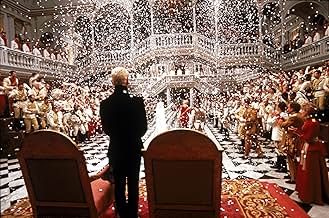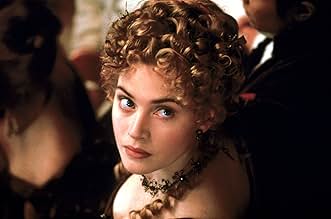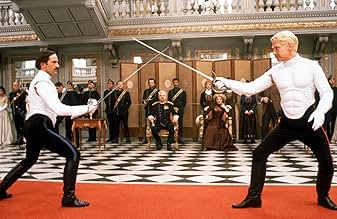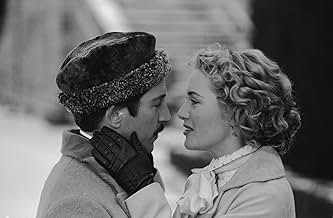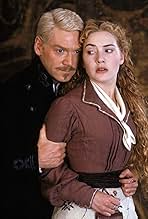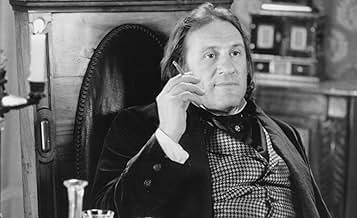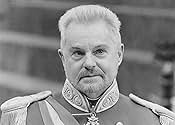Hamlet
- 1996
- Tous publics
- 4h 2min
NOTE IMDb
7,7/10
41 k
MA NOTE
Hamlet, prince du Danemark, rentre chez lui et découvre son père assassiné et sa mère remariée au meurtrier, son oncle. Pendant ce temps, la guerre couve.Hamlet, prince du Danemark, rentre chez lui et découvre son père assassiné et sa mère remariée au meurtrier, son oncle. Pendant ce temps, la guerre couve.Hamlet, prince du Danemark, rentre chez lui et découvre son père assassiné et sa mère remariée au meurtrier, son oncle. Pendant ce temps, la guerre couve.
- Réalisation
- Scénario
- Casting principal
- Nommé pour 4 Oscars
- 9 victoires et 25 nominations au total
Rizz Abbasi
- Attendant to Claudius
- (as Riz Abbasi)
Avis à la une
Olivier, Kosentsev, Richardson, Coranado, Zefferelli, and Almerayeda have all directed Hamlet but Branagh's the only one who got it right.
This is the only film of "Hamlet" that contains the full four hours of William Shakespeare's masterpiece and gives a unique feel to the whole story.
Not many directors could pull this off without boring their audience but Branagh's skillful use of bravora film style and stunt casting allows people to see the importance of the scenes that are usually cut out.
Examples of this include Gerarde Depardue as Ranyaldo whos entire purpose in the film was to simply say "yes my lord" as Polonius asks him to spy on Leartes. This also included Billy Crystal as the grave digger, Robin Williams as Osric, Jack Lemmon as Marcellous, and Charlton Heston as the actor.
Branagh's performance of the Act 4 scene 4 soliloquy (Which again is usually cut out) is nothing short of c cinematic marvel as the camera slowly pulls back as the intensity grows. It is a scene that literally made me want to jump out of my chair and start applauding.
Branagh is the only film maker that understood the importance of every scene in this film and knew how to convey that importance to the general audience.
This is a must see for everyone who enjoy's good story telling, brilliant acting,and incredible direction. All of these part of William Shakespeares greatest triumph.
This is the only film of "Hamlet" that contains the full four hours of William Shakespeare's masterpiece and gives a unique feel to the whole story.
Not many directors could pull this off without boring their audience but Branagh's skillful use of bravora film style and stunt casting allows people to see the importance of the scenes that are usually cut out.
Examples of this include Gerarde Depardue as Ranyaldo whos entire purpose in the film was to simply say "yes my lord" as Polonius asks him to spy on Leartes. This also included Billy Crystal as the grave digger, Robin Williams as Osric, Jack Lemmon as Marcellous, and Charlton Heston as the actor.
Branagh's performance of the Act 4 scene 4 soliloquy (Which again is usually cut out) is nothing short of c cinematic marvel as the camera slowly pulls back as the intensity grows. It is a scene that literally made me want to jump out of my chair and start applauding.
Branagh is the only film maker that understood the importance of every scene in this film and knew how to convey that importance to the general audience.
This is a must see for everyone who enjoy's good story telling, brilliant acting,and incredible direction. All of these part of William Shakespeares greatest triumph.
I must say that, looking at Hamlet from the perspective of a student, Brannagh's version of Hamlet is by far the best. His dedication to stay true to the original text should be applauded. It helps the play come to life on screen, and makes it easier for people holding the text while watching, as we did while studying it, to follow and analyze the text.
One of the things I have heard criticized many times is the casting of major Hollywood names in the play. I find that this helps viewers recognize the characters easier, as opposed to having actors that all look and sound the same that aid in the confusion normally associated with Shakespeare.
Also, his flashbacks help to clear up many ambiguities in the text. Such as how far the relationship between Hamlet and Ophelia really went and why Fortinbras just happened to be at the castle at the end. All in all, not only does this version contain some brilliant performances by actors both familiar and not familiar with Shakespeare. It is presented in a way that one does not have to be an English Literature Ph.D to understand and enjoy it.
One of the things I have heard criticized many times is the casting of major Hollywood names in the play. I find that this helps viewers recognize the characters easier, as opposed to having actors that all look and sound the same that aid in the confusion normally associated with Shakespeare.
Also, his flashbacks help to clear up many ambiguities in the text. Such as how far the relationship between Hamlet and Ophelia really went and why Fortinbras just happened to be at the castle at the end. All in all, not only does this version contain some brilliant performances by actors both familiar and not familiar with Shakespeare. It is presented in a way that one does not have to be an English Literature Ph.D to understand and enjoy it.
As a play, Hamlet is an anchor of civilization, and even moderately successful films are worth seeing. But in making the translation to film, the artist has two challenges.
The first concerns the work as drama. This is Shakespeare's most ambitious vision, one he tinkered with and enlarged both conceptually and literally. The purest choice, the only choice which can encompass the full weave of the work, is to include everything -- and that's what Branagh has done. Consequently, this work has extra dimensions of life. In doing so, he's included some nice touches:
--gone are superficial hints of mother-lust in the closet scene. These were never in the text.
--we are reminded that Hamlet's initial and sustaining anger is because his uncle jumped into the line of succession
--we see the hints that Hamlet was a student of Bruno in the book on witchcraft he consults after seeing the ghost. Also his book on `matters' (often thought to be Bruno's) is actually given to Ophelia. Nice. Shows deep research.
--Polonius is treated humanely, as more than a dottering fool. This makes Ophelia's loss (and earlier obedience) believable.
The second challenge is cinematic. The play was written for sparse settings; it translates naturally to audio tape and unnaturally to film. So the filmmaker has an open palette. Branagh makes some interesting choices. Many work extremely well, in particular the mirrors in the `to be' and Ophelia sequence. Others are strange:
--he introduces recognizable actors in secondary roles to jar us into the realization that this is a play. (One of these is really funny. How do you portray an actor among actors playing non-actors. Well, you get a noticeably BAD actor. I wonder if Heston knows he'll be goofed on for this for many decades as this film outlives his sandled perorations.)
--he introduces some almost satirical film reflections: a cheesy ghost, an Errol Flynn chandelier swing...
--he provides visual overlays for some of the images implied in the text: Hamlet's lovemaking, considerations in Norway, reflections of the players. This ruins a few of the important ambiguities but we do have a wealth to spend after all.
--in perhaps the worst loss of ambiguity, he makes Fortinbras an invader. This is done only to allow for some cinematic sweep at the end. Okay, I'll reluctantly buy it since the alternative is extended mugging in the death scenes.
I think Branagh and collaborators meet the first challenge nearly perfectly. As to the second challenge, this is our very best film version, in part because of extending the US tradition of playing the characters as real people (versus the UK tradition of characters as speechifiers). So far as the cinematic challenge, there are some great, really great visions here, but there are also some big cinematic misses which keeps this far from perfect. Until Greenaway attempts it, this is the best film Hamlet we have, and that simply makes it one of the best, most rewarding films ever. I'll bet Branagh tries again before he dies.
The first concerns the work as drama. This is Shakespeare's most ambitious vision, one he tinkered with and enlarged both conceptually and literally. The purest choice, the only choice which can encompass the full weave of the work, is to include everything -- and that's what Branagh has done. Consequently, this work has extra dimensions of life. In doing so, he's included some nice touches:
--gone are superficial hints of mother-lust in the closet scene. These were never in the text.
--we are reminded that Hamlet's initial and sustaining anger is because his uncle jumped into the line of succession
--we see the hints that Hamlet was a student of Bruno in the book on witchcraft he consults after seeing the ghost. Also his book on `matters' (often thought to be Bruno's) is actually given to Ophelia. Nice. Shows deep research.
--Polonius is treated humanely, as more than a dottering fool. This makes Ophelia's loss (and earlier obedience) believable.
The second challenge is cinematic. The play was written for sparse settings; it translates naturally to audio tape and unnaturally to film. So the filmmaker has an open palette. Branagh makes some interesting choices. Many work extremely well, in particular the mirrors in the `to be' and Ophelia sequence. Others are strange:
--he introduces recognizable actors in secondary roles to jar us into the realization that this is a play. (One of these is really funny. How do you portray an actor among actors playing non-actors. Well, you get a noticeably BAD actor. I wonder if Heston knows he'll be goofed on for this for many decades as this film outlives his sandled perorations.)
--he introduces some almost satirical film reflections: a cheesy ghost, an Errol Flynn chandelier swing...
--he provides visual overlays for some of the images implied in the text: Hamlet's lovemaking, considerations in Norway, reflections of the players. This ruins a few of the important ambiguities but we do have a wealth to spend after all.
--in perhaps the worst loss of ambiguity, he makes Fortinbras an invader. This is done only to allow for some cinematic sweep at the end. Okay, I'll reluctantly buy it since the alternative is extended mugging in the death scenes.
I think Branagh and collaborators meet the first challenge nearly perfectly. As to the second challenge, this is our very best film version, in part because of extending the US tradition of playing the characters as real people (versus the UK tradition of characters as speechifiers). So far as the cinematic challenge, there are some great, really great visions here, but there are also some big cinematic misses which keeps this far from perfect. Until Greenaway attempts it, this is the best film Hamlet we have, and that simply makes it one of the best, most rewarding films ever. I'll bet Branagh tries again before he dies.
Still being of school age, and having to learn Shakespeare almost constantly for the last four years (which is very off-putting of any writer, no matter how good), I didn't really expect to enjoy this film when my English teacher put it on; I thought it'd be the typical English lesson movie: bad acting, awfully shot, badly edited and the dreaded awful old dialog, so, as you can tell, I was all but ready to go into a coma from the go. However, I watched and, much to my disturbance, found myself not only paying attention, but actually enjoying the movie too. This production of Hamlet is possibly one of the best drama movies I have seen in a long time- and it really brings to life what I expect Shakespeare wanted his plays to be like (well, with the difference that this is cinema) much better than my English teacher harking over the text ever possibly could. The story is good, the dialog seems to flow with an unexpected grace that is far from boring (though a little hard to keep up with if you aren't used to Shakespeare's language) and even the smallest parts are performed with a skill you wouldn't expect; mainly, perhaps, due to the staggering number of cameos this movie has. Brian Blessed and Charlton Heston are as great as you'd expect these two veterans to be, even in such small parts, but it is Robin Williams as Osric and Billy Crystal as the Gravedigger who really stand out, giving such minor parts an unexpected zest, as well as offering some comic relief amidst the tragedy.
The main stars, of course, are also wonderful. Kenneth Branagh excels as Hamlet, bringing not only the confusion and pain required to the roll, but also a sort of sardonic air which plays beautifully in the comic scenes, making the movie as a whole much more watchable. The other major players are also good, but it is Kenneth Branagh who stands head and shoulders above the rest in the title role.
The set pieces, too, are often quite stunning, giving a refreshing change to the danky old castle corridors we're used to seeing in Shakespeare productions, as well as a real sense of the country around them.
Of course, the movie, taken as a movie in its own right, is not without faults, but no major ones (the pacing is the only real problem I can think of offhand, as well as the prose for anyone not used to, as I said, Shakesperean language) and, especially when compared to the sort of Shakespeare productions I'm used to seeing in class, it really is quite brilliant. It's even made me rethink my previous typical teenager stance on Shakespeare, that his plays are boring (I came to the conclusion it's not the plays that are boring, merely the teachers who recite them in class). If only they made all of his plays into movies such as this one, English students in schools everywhere might have a higher opinion of the Bard.
Overall 7/10
The main stars, of course, are also wonderful. Kenneth Branagh excels as Hamlet, bringing not only the confusion and pain required to the roll, but also a sort of sardonic air which plays beautifully in the comic scenes, making the movie as a whole much more watchable. The other major players are also good, but it is Kenneth Branagh who stands head and shoulders above the rest in the title role.
The set pieces, too, are often quite stunning, giving a refreshing change to the danky old castle corridors we're used to seeing in Shakespeare productions, as well as a real sense of the country around them.
Of course, the movie, taken as a movie in its own right, is not without faults, but no major ones (the pacing is the only real problem I can think of offhand, as well as the prose for anyone not used to, as I said, Shakesperean language) and, especially when compared to the sort of Shakespeare productions I'm used to seeing in class, it really is quite brilliant. It's even made me rethink my previous typical teenager stance on Shakespeare, that his plays are boring (I came to the conclusion it's not the plays that are boring, merely the teachers who recite them in class). If only they made all of his plays into movies such as this one, English students in schools everywhere might have a higher opinion of the Bard.
Overall 7/10
First, what I didn't like. The acting was not really up to the Hamlet standard. Branagh was really over-the-top, doing a lot of yelling mostly. In my opinion, those actors who were not big-name celebrities generally did a better job; though I would except Billy Crystal and Robin Williams. (And Charlton Heston, too, but I wasn't sure if he was playing at being a hack.) A lot of the ambiguities in the play were clearly resolved one way in the flashbacks.
What I think speaks very much in this play's favor is that it is accessible. Shakespeare is hard to understand for the vast majority of people nowadays; many people are not even inclined to try, because of its reputation as Serious Literature and its archaic English. If they see this film they will understand clearly at least one man's interpretation of the play. They will be seeing it more as Shakespeare's audiences saw it: a play with sword fights and battles, and mighty kings and nobles, murder and incest and evil schemes and ghosts--and great art, if one cares to look for it, but in Shakespeare's day most didn't, any more than most people do now. Branagh's overacting, and his forcing of his interpretation of the story on the viewer, may detract from Shakespeare's art somewhat, but it is better that modern audiences get a piece of it, rather than nothing.
I've got to say one more thing though. Some people are complaining that "it's set in the 19th century and that wasn't Shakespeare's time". Well, in Shakespeare's time their costume and scenery was that of their own day for all of their plays. Shakespeare may have SAID it's in the days of ancient Rome or medieval Denmark or whatever, but he didn't dress his characters up like they were, he used the costumes of his own time. For the same reason his plays are full of anachronisms. For example, in King John the English and French have cannons--in Robin Hood's day. In Julius Caesar they talk of chimneys, which wouldn't be invented for another thousand years, and in Henry IV they talk about Machiavelli, who wasn't even born yet then. So I think this objection is silly--you might as well complain that the play isn't in Danish (after all they live in Denmark don't they?).
What I think speaks very much in this play's favor is that it is accessible. Shakespeare is hard to understand for the vast majority of people nowadays; many people are not even inclined to try, because of its reputation as Serious Literature and its archaic English. If they see this film they will understand clearly at least one man's interpretation of the play. They will be seeing it more as Shakespeare's audiences saw it: a play with sword fights and battles, and mighty kings and nobles, murder and incest and evil schemes and ghosts--and great art, if one cares to look for it, but in Shakespeare's day most didn't, any more than most people do now. Branagh's overacting, and his forcing of his interpretation of the story on the viewer, may detract from Shakespeare's art somewhat, but it is better that modern audiences get a piece of it, rather than nothing.
I've got to say one more thing though. Some people are complaining that "it's set in the 19th century and that wasn't Shakespeare's time". Well, in Shakespeare's time their costume and scenery was that of their own day for all of their plays. Shakespeare may have SAID it's in the days of ancient Rome or medieval Denmark or whatever, but he didn't dress his characters up like they were, he used the costumes of his own time. For the same reason his plays are full of anachronisms. For example, in King John the English and French have cannons--in Robin Hood's day. In Julius Caesar they talk of chimneys, which wouldn't be invented for another thousand years, and in Henry IV they talk about Machiavelli, who wasn't even born yet then. So I think this objection is silly--you might as well complain that the play isn't in Danish (after all they live in Denmark don't they?).
Le saviez-vous
- AnecdotesRobin Williams and Billy Crystal were not allowed to be on the set at the same time during filming, for fear they would crack up the cast and crew, and cause major production delays.
- GaffesIn the very long shot along the length of the throne room, the cameras are visible in the mirrors.
- Versions alternativesTwo versions should have been theatrically released at the same time: a complete 242-minutes director's cut shown only in selected venues (large key cities) and a shorter, wide-release version that ran about two-and-a-half hours. After some critical backlash, Castle Rock decided to release the complete 4 hours everywhere in the US and use the shorter version for some overseas territories.
- Bandes originalesIn Pace
Music by Patrick Doyle
Performed by Plácido Domingo
Text for The Book of Wisdom
Text researched and adapted by Russell Jackson
Recorded at Studio 33, Hamburg, Germany
Engineered by Ambrogio Crotte and Luis Rodriguez
Original soundtrack available on Sony Classical Records
Meilleurs choix
Connectez-vous pour évaluer et suivre la liste de favoris afin de recevoir des recommandations personnalisées
Détails
- Date de sortie
- Pays d’origine
- Langue
- Aussi connu sous le nom de
- William Shakespeare's Hamlet
- Lieux de tournage
- Sociétés de production
- Voir plus de crédits d'entreprise sur IMDbPro
Box-office
- Budget
- 18 000 000 $US (estimé)
- Montant brut aux États-Unis et au Canada
- 4 708 156 $US
- Week-end de sortie aux États-Unis et au Canada
- 90 684 $US
- 29 déc. 1996
- Montant brut mondial
- 6 296 790 $US
- Durée4 heures 2 minutes
- Couleur
- Rapport de forme
- 2.20 : 1
Contribuer à cette page
Suggérer une modification ou ajouter du contenu manquant




